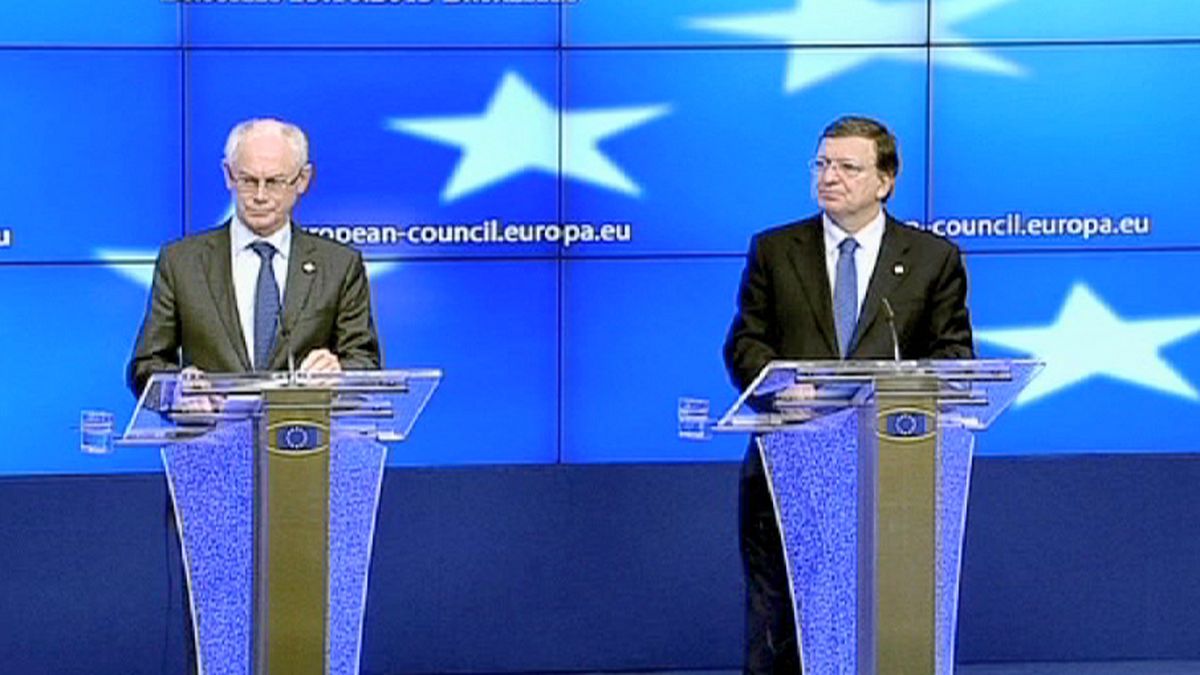The scandal over allegations of the US spying on European leaders has overshadowed the EU summit, in Brussels. France and Germany have united in their demands for a discussion on a non-spying agreement with America, and other EU member states could join them.
Economic recovery and migration policy were actually on the summit agenda and were debated but decisions will be made in December.
The issue of migration has taken on a sense of urgency since the deaths in the Mediterranean of 379 people earlier this month. The migrants had almost reached the Italian island of Lampedusa when their boat ran into trouble.
“We ask the newly established task force for the Mediterranean, led by the European Commission with member states, to come up quickly with concrete operational proposals, for a more efficient use of European policies and tools,” said President of the European Council Herman van Rompuy.
Southern EU countries, such as Italy, Spain, Malta and Greece, complain they cannot cope with the increasing number of migrants and are asking wealthier nations in the northern part of the bloc to do more.
Italy’s Prime Minister Enrico Letta stressed this point, saying: “We consider it very important that the conclusions of the summit include the idea of ‘solidarity’! I underline this, because we all know, that this cannot been taken for granted!”
Northern countries said they already take in 70 percent of the migrants.
Immigration is an explosive topic in some EU states with strong support for right-wing parties and high unemployment.
The tiny island of Malta with a population of less than 400,000 has seen almost 17,000 illegal immigrants arrive over the last decade. It has the highest rate of asylum applications per capita in the world.
Malta’s Prime Minister Joseph Muscat spoke to euronews correspondent Isabel Marques da Silva.
euronews: “Prime minister, before you came to the summit you gave the example of European solidarity with the bailouts and you even kind of threatened not to be so cooperative if there was not the same kind of solidarity in terms of migration. Are you satisfied with your partners in the Council and the conclusions they arrived at in this matter?”
Malta PM Joseph Muscat: “Most important is that the Council agreed that there should be a timeline, a clearly inscribed deadline. The Council agreed that by next December Europe will decide and will take the operational decisions to face this crisis.”
euronews: “What are you going to do in the next six to eight months when these boats keep arriving in Malta?”
Muscat: “People who apply for asylum but get their application refused need to go back. That should be part of the Frontex terms of reference and work.”
euronews: “But, instead of repatriating them, considering the situation in countries like Tunisia or Libya is not very good, could they be re-settled in other European countries? Did you get other countries to receive refugees?”
Muscat: “I know I might sound hard on this but that is how it works. My point is that if the situation right now is that all those who get their application refused stay in Europe, that’s not on. That is something that we want to solve.”
euronews: “But your Italian colleague, Mr Letta, told us that from the 35,000 people they received this year, 73 percent were entitled to have the asylum status. Most of these people should stay in Europe, but maybe they could be spread a little bit more. Did you get any commitments from your colleagues from other countries in the European Union?”
Muscat: “I believe it is Europe’s job to do that. I believe it is an important step forward. I do believe that the Commission is proposing something similar, so that is something that offers relief. Then there are other points which are contentious. It is a thorny issue.”
euronews: “You also said it is not only about putting money on the table but the fact is that Italy is now receiving 30 million euros, and we have seen some reception centres with terrible conditions. Do you have financial needs and how would you use more money?”
Muscat: “We don’t say there’s isn’t a need to improve the infrastructure. But we are also saying that there is the need for detention. If someone comes into our country without documentation you cannot just let him or her go. We can’t just close our eyes to further people smuggling. What are we saying if we don’t have detention? That we should just close our eyes and instead of making just one trip between Libya and Malta, we should also close our eyes to another trip between Malta and Italy? We don’t do that!”
euronews: “So you agree that the philosophy of EUROSUR (the European border surveillance system), that was talked about during this summit, should be to patrol more in a way to keep the boats away and not the conditions to rescue people at sea in a safe way? Should there be coordinated rescuing at sea?”
Muscat: “Yes, but there should not be a situation where the message that goes out to the smugglers who are abusing these people is: ‘Well send more boats, we will rescue them and they will get in’. So, I do think that we need to rethink our visa system, our asylum system and to make legal migration in Europe more possible and more plausible.”
